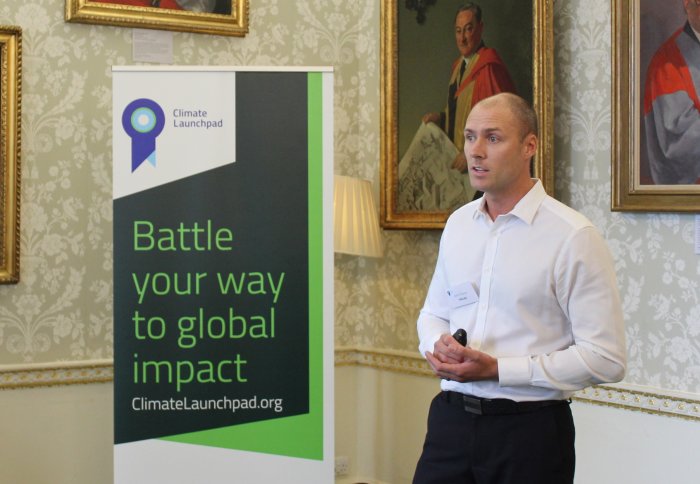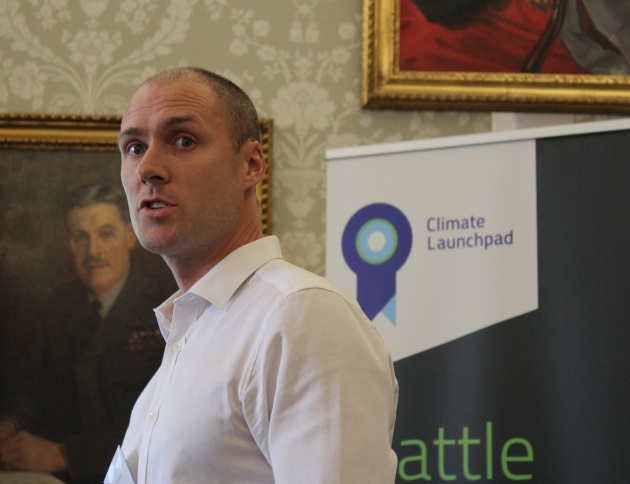Imperial students lead the way with prize winning green innovations

Imperial startups take silver and bronze in the ClimateLaunchpad National Final 2018 for their ambitious green business ideas
In September, Imperial College London hosted the UK National Final of the ClimateLaunchpad competition and celebrated a double-win with two Imperial teams, Biokind and PlasTell, earning their place at the Global Grand Final in Edinburgh later this year.
The competition at this year's UK National was particularly fierce, all of the teams were incredibly high calibre making it difficult for us to choose the winners. Professor Richard Templer Judge for the UK National Final
ClimateLaunchpad is the world’s largest green business ideas competition and is part of the European Institute of Innovation and Technology's Climate-KIC programme. The Grantham Institute – Climate Change and the Environment played an essential role in setting up Climate-KIC, which aims to provide the innovation, entrepreneurship, education and expert guidance needed to shape Europe's climate change agenda.
The three winning teams from the UK National will head to the Grand Final and compete alongside 135 other teams, they will all pitch their ideas in front of an audience of over 700 leading policymakers, investors and entrepreneurs from around the world. Each team will be hoping to take home the grand prize of €10,000 and earn access to the Climate-KIC Accelerator, delivered by Imperial's Centre for Cleantech Innovation, which provides early stage entrepreneurs with training and funding to help their business grow.
"It is obvious that we need more innovative technologies to tackle global warming and it's inspiring to see so many great ideas coming from the next generation," said Professor Richard Templer, Director of Innovation at the Grantham Institute and a judge for the UK National Final.
"The competition at this year's UK National was particularly fierce, all of the teams were incredibly high calibre making it difficult for us to choose the winners. We wish our three winners the best of luck in the Grand Final and we hope all the teams continue to grow their businesses in the future."
Three ideas heading to the Grand Final
PlasTell
 Most plastic waste worldwide is not recycled because the numerous types of visually identical but chemically different plastics have to be separated and processed individually. PlasTell uses infrared spectroscopy to identify different types of plastics. The team of Imperial students, who took third-place, developed the low-cost tool to help plants maximise sorting efficiency so that more plastic waste can be recycled globally, reducing the amount of plastic waste in landfills.
Most plastic waste worldwide is not recycled because the numerous types of visually identical but chemically different plastics have to be separated and processed individually. PlasTell uses infrared spectroscopy to identify different types of plastics. The team of Imperial students, who took third-place, developed the low-cost tool to help plants maximise sorting efficiency so that more plastic waste can be recycled globally, reducing the amount of plastic waste in landfills.
BioKind
 Biokind, who produce a sustainable protein feed for fish and shrimp farming, swam into second. The feed is produced via a natural fermentation process of agricultural waste. Replacing fishmeal and soy protein in shrimp farms, which are one of the heaviest carbon-dioxide polluters in the aquaculture sector, with Biokind's product can reduce carbon-dioxide by over 5 billion tonnes. Biokind was founded by Maxwell Swinscow-Hall and Imperial students and alumnus Chien Chua and Rui Yan (Ryan) Lee.
Biokind, who produce a sustainable protein feed for fish and shrimp farming, swam into second. The feed is produced via a natural fermentation process of agricultural waste. Replacing fishmeal and soy protein in shrimp farms, which are one of the heaviest carbon-dioxide polluters in the aquaculture sector, with Biokind's product can reduce carbon-dioxide by over 5 billion tonnes. Biokind was founded by Maxwell Swinscow-Hall and Imperial students and alumnus Chien Chua and Rui Yan (Ryan) Lee.
TRAILAR

Racing ahead TRAILAR won first place. The innovation combines the roof space on trailers and vehicles with cutting edge solar technology to capture a natural energy source, providing a greener cleaner urban friendly delivery solution. The company is supported by DHL, who employ TRAILAR's ultra-thin, flexible solar panels to cut fuel consumption by 5% and can lower the emissions by 4 tonnes per vehicle each year.
Article supporters
Article text (excluding photos or graphics) © Imperial College London.
Photos and graphics subject to third party copyright used with permission or © Imperial College London.
Reporter
Ms Abbie Stone
Centre for Environmental Policy



